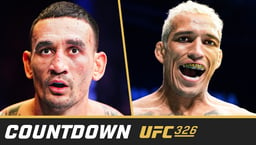
Issue 074
April 2011
A rarely heard-from Russian-German national, the 32-year-old Siver has been collecting fight-night bonuses like they’re going out of style
What’s fighting life like for Germany’s premier MMA fighter? What are the German gyms and facilities like? The sport obviously isn’t as big business there as in the US or Canada.
Dennis: “The German MMA scene is still very young and it’s in a constant state of flux. There are a couple of good MMA gyms right now that have everything for training MMA, but they are few and far between. My gym is not even a real gym, it’s a time share within a judo club. What we do is, we rent out a training area on a daily basis, on an hourly basis to have our own training. We have a couple of walls, some mats and a couple sandbags. That’s pretty much it. For me, it’s not enough anymore so what I have to do is, if I want to train two times a day as a professional, I train at six different schools. I train MMA with Kiboju, my team, four times a week, I go to train wrestling two times a week somewhere else, I train jiu-jitsu two times a week somewhere else, then I go to boxing training and do my weight training somewhere else. So that’s how I manage to keep up and train as a professional. Kiboju being a team name of the team I train with. It’s not a gym or a particular place it’s a team name.”
You’ve finished fights twice with the help of a spinning back kick and it’s now become your trademark. Being a former German kickboxing champion, what tips can you give readers for perfecting it?
“If you want to have a good spinning back kick, the one thing you have to do is train, train and train. It’s a matter of technique really. I repeat and re-repeat it, and train it over and over. Every training session and sparring session I try to get it in as often as I can. The funny thing is, in the past when I started MMA fighting I never really tried that sort of a kick. But when I kept looking at clips of my fights, or of other people’s fights, I realized a lot of MMA guys didn’t really seem to be expecting such a kick, or the various strikes from kickboxing. They were completely open to them and didn’t really position themselves to block them. So when I fought in Dublin [against Nate Mohr at UFC 93] and came back to the UFC, the fight was pretty close going into the third round so I said, ‘OK, let’s just give it a try.’ And I landed the kick and won with it. When I tried it again against Paul Kelly that’s when it was actually something I had planned for, and it also worked great. The problem is people have started to adapt and everybody expects my kicks now. Every time I’m fighting some body I listen to the opponent’s corner and I can hear them saying, ‘Go left, go left, go away from his power kick.’ Basically, what’s happening now is that people are expecting the kick so much; especially in the Spencer Fisher fight. As soon as Spencer was immobile for one second his corner immediately started yelling, ‘Move away from him, move to the left, move away from him.’ But the funny thing about it in a roundabout way is that because everyone’s expecting the spinning back kick now, it leaves a couple openings for me to try other things that people aren’t expecting. Left hooks for a start.”
There’s negative media attention around MMA in Germany, and it’s even been banned from television. What sort of coverage do you get in the press as Germany’s best mixed martial artist?
“I’ve been featured in a couple of newspapers that have written articles or had negative articles about MMA, but the press are getting better and better at understanding it. Right now it’s still a very early stage. You’re looking at a couple of men’s magazines sometimes, the sports press and some newspapers.”
You still manage to be a very effective striker despite your very short reach. What’s your secret?
“The secret is just the amount of training. What my team do is, we adapt to every specific opponent. We look at what his strengths and what his weaknesses are. Particularly, as far as weaknesses go, we try to adapt the striking and training specifically to those weaknesses by working on positions and different footwork. The one thing to keep in mind is I train with a lot of people who are much taller than I am, and with a much better reach than I have. In
fact, my entire life I’ve been training with guys who are taller than me and with a longer reach, so it’s nothing special. Actually, because of that, it’s easier for me to fight guys who are bigger than me, as opposed to guys who are shorter than me.”
When you were released by the UFC in 2008, did you know you were going to come back and be a main-card fighter?
“I can’t really know that I’m going to be back in there. Obviously I dreamed of coming back, obviously I gave my best, but I really didn’t know. But, what I did was train like a mad man. I invested a lot of time and effort into winning outside of the UFC. I trained more, I trained more intensively. It was my dream to come back to the UFC and my dream became a reality. But, it wasn’t something I just knew, it was hard work paying off.”










